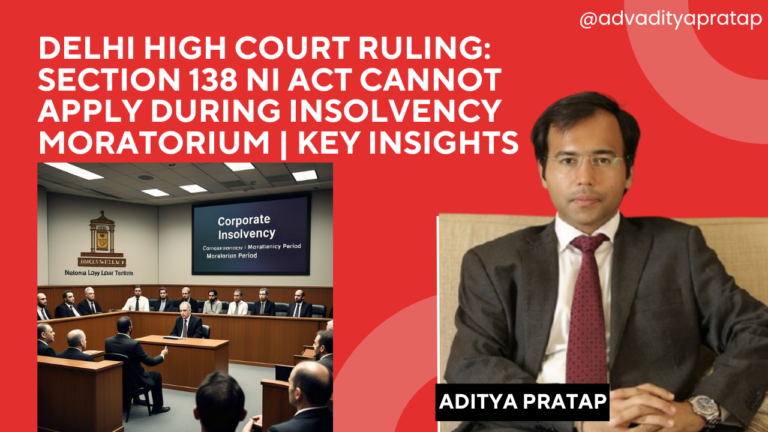
Brief Facts of the Case
The petitioners, who were the suspended directors and authorized signatories of the company, issued six cheques on behalf of the company in compliance with an order passed by the National Consumer Disputes Redressal Commission (NCDRC) on 24th July 2019.
Two cheques amounting to five lakhs each, dated 23rd July 2019, were presented to the bank, which were duly honored. However, after the company entered the Corporate Insolvency Resolution Process (CIRP) under Section 7 of the Insolvency and Bankruptcy Code (IBC) 2016, the moratorium period commenced under Section 14 of the respective Act.
Subsequently, two cheques of ten lakhs each were presented for encashment, but they were dishonored by the bank. The reason for dishonor was recorded as ‘Drawer Signature to operate account not received.’ A complaint was then filed, and the Metropolitan Magistrate at the Rouse Avenue Court, Delhi, issued a summoning order for an offense under Section 138 of the Negotiable Instruments Act, 1881.
The petitioners approached the Delhi High Court seeking to quash the summoning order.
Brief About the Legal Mechanism Involved
Section 138 of the Negotiable Instruments Act, 1881 deals with punishment for dishonoring of cheques due to insufficiency of funds or other related reasons.
Section 7 of the Insolvency and Bankruptcy Code, 2016 (IBC) pertains to the initiation of the Corporate Insolvency Resolution Process by financial creditors against the company.
Section 14 of the IBC imposes a moratorium period, during which there is a prohibition on the institution of suits or the commencement of pending suits. This section also prohibits the corporate debtor from transferring, encumbering, alienating, or disposing of any of its assets or any legal right or beneficial interest.
Submission by Counsel of Petitioners
The petitioners contended that during the moratorium period, the cheques were not encashable, which absolves them of liability under Section 138 of the Negotiable Instruments Act, 1938. After the appointment of the Insolvency Resolution Professional (IRP) under Section 17 of the IBC, all the affairs of the company were carried out by the IRP. The petitioners no longer had any role in the company’s affairs when the alleged offense occurred.
Observations by the Court
The court noted that when the cheques were presented for payment, the accounts were blocked due to the orders of the National Company Law Tribunal (NCLT). As a result, the liability could not be imposed on the petitioners, as their control over the company had ceased to exist. The court observed that the ingredients for constituting an offense under Section 138 of the Negotiable Instruments Act, 1881 occurred after the commencement of the moratorium period. Therefore, the petitioners could not be held vicariously liable for the dishonored cheques.
The petition was allowed, and the other proceedings concerning the matter were disposed of.

About the Author
Aditya Pratap is a practicing lawyer and founder of Aditya Pratap Law Offices based in Mumbai. An alumnus of NALSAR University of Law, Hyderabad, he has over 11 years of experience and has handled numerous cases of public and private significance. For more insights, you can visit his website: adityapratp.in. Watch him in TV interviews.